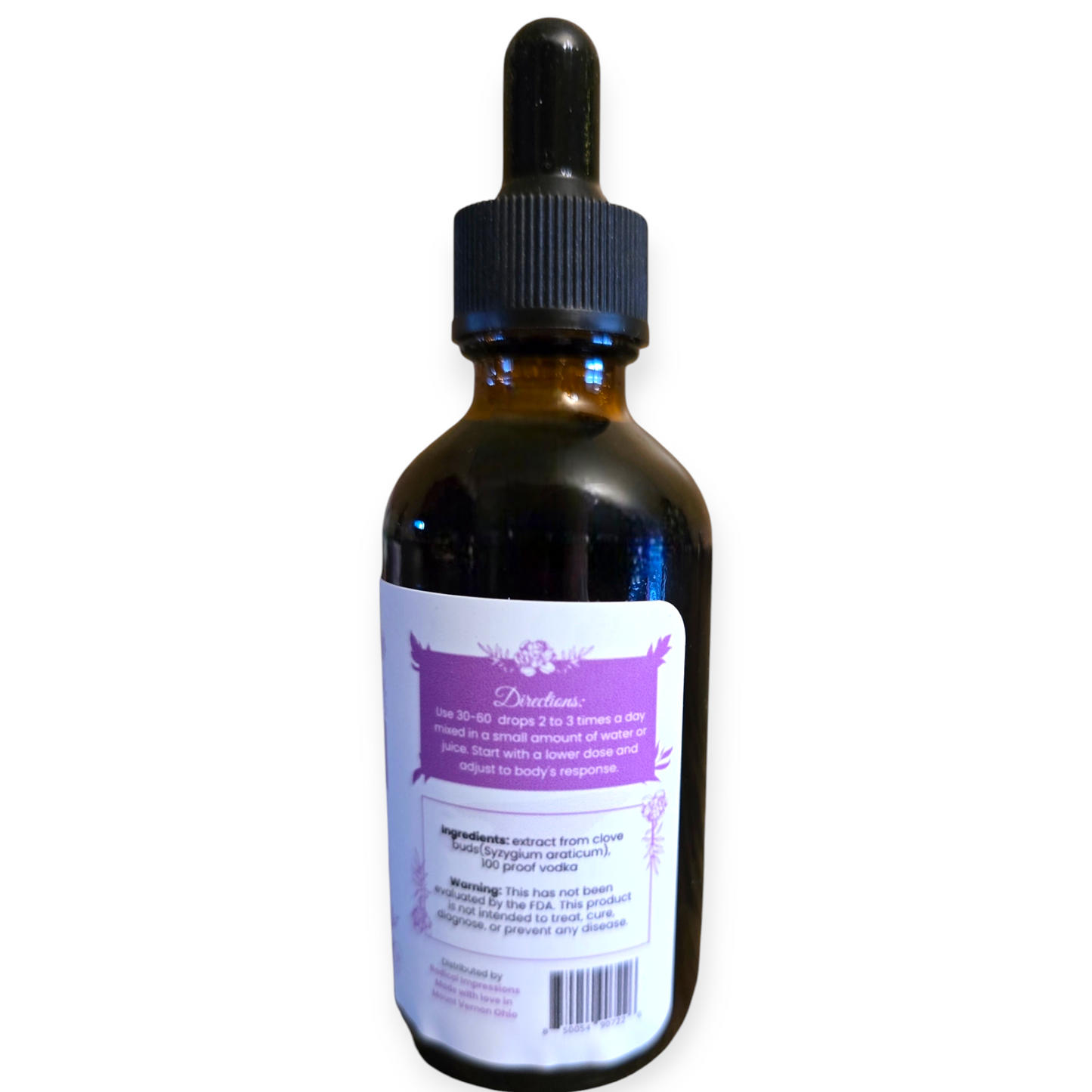Radical Impressions
clove tincture
Clove tincture
Couldn't load pickup availability
Clove tinctures are liquid extracts made by steeping clove buds (from the Syzygium aromaticum tree) in alcohol or another solvent to extract the active compounds. Cloves are rich in eugenol, a powerful compound with antiseptic, anti-inflammatory, and analgesic properties. Clove tinctures are concentrated and easy to use, typically applied topically, taken orally in diluted form, or added to beverages.
Preparation of Clove Tincture
To make a clove tincture, dried clove buds are soaked in high-proof alcohol (like vodka) for several weeks. This process extracts the medicinal compounds. The tincture is then strained and stored in a dark, glass bottle to preserve its potency.
Key Compounds in Clove Tincture
Eugenol: Primary bioactive compound with antioxidant, antimicrobial, and analgesic properties.
Flavonoids: Contribute to anti-inflammatory effects.
Vitamins & Minerals: Small amounts of vitamin C, vitamin K, calcium, and magnesium.
Benefits of Clove Tincture
1. Oral Health
Pain Relief: Helps alleviate toothaches and gum pain due to its analgesic properties.
Antimicrobial: Inhibits bacteria causing gum disease and cavities.
Breath Freshening: Acts as a natural remedy for bad breath.
2. Digestive Health
Relieves Indigestion: Promotes healthy digestion and reduces bloating, gas, and nausea.
Anti-Parasitic: Can help expel intestinal worms and parasites.
3. Anti-Inflammatory Effects
Helps reduce inflammation associated with arthritis, joint pain, and skin conditions.
4. Antimicrobial Properties
Protects against bacteria, fungi, and viruses. Often used as a natural remedy for minor infections.
5. Immune Support
Antioxidant-rich clove tincture boosts the immune system and protects cells from oxidative stress.
6. Respiratory Support
Helps alleviate symptoms of colds, sore throat, and congestion.
Eases coughs and clears mucus when diluted and used as a gargle or added to warm water.
7. Pain Relief
Effective for muscle aches, headaches, and joint pain when applied topically after dilution with a carrier oil.
8. Skin Health
Can reduce acne and skin irritation due to its antibacterial properties.
How to Use Clove Tincture
Topical Use: Dilute with a carrier oil (like coconut or almond oil) for massages or as a spot treatment.
Oral Use: Add a few drops to water or tea. Start with small amounts to avoid stomach upset.
Mouthwash: Mix with water for a natural antibacterial rinse.
Steam Inhalation: Add a few drops to hot water for respiratory relief.
Precautions
Dilution: Always dilute before use, as undiluted clove tincture can irritate skin or mucous membranes.
Allergies: Perform a patch test to check for allergic reactions.
Pregnancy & Children: Consult a healthcare provider before use.
Overuse: Excessive consumption may cause gastrointestinal discomfort or liver damage due to high eugenol content.
Conclusion
Clove tinctures offer a natural, versatile remedy for a variety of health issues, from oral care to immune support.
Share




